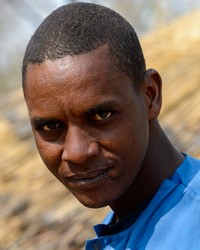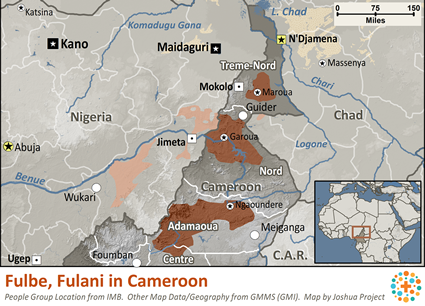Many centuries ago, the Fulani tribes migrated from northern Africa and the Middle East into Central and West Africa. Most of them are still nomadic shepherds who travel with their flocks, in search of better grazing land. They are located in an almost horizontal strip across West Africa. The Sahara Desert forms their northernmost boundary, while the threat of tsetse flies control their movement to the south. Over the years, some of the Adamawa Fulani have advanced from being exclusively shepherds to being scholarly, influential leaders in their communities.
The Fulani tribes are grouped and named according to their locations, occupations, and dialects. The Adamawa Fulani are the group of Fulani who live in Nigeria's Adamawa province. There are also Fulani groups found in Cameroon and Chad, but these trace their origins back to the Adamawa Fulani of Nigeria. They have lighter skin, thinner lips, and straighter hair than other African groups living near them.
Although most of the Adamawa Fulani are shepherds, some also raise a few crops such as sorghum or corn. They trade with neighboring tribes for millet, yams, and peanuts. Milk is the main staple in their diet, and this distinguishes them from the tribes who do not milk their cattle. They also produce butter, which can be traded in the markets.
The Fulani nomads live in "wet season camps" while planting and harvesting. The pastures are lush and green, and the cattle graze freely. These camps consist of beehive-like huts made of woven twigs, leaves, and grass. During the dry seasons they camp in portable huts, moving the cattle or sheep to well-watered lands in the flood plains.
Adamawa Fulani men hunt, trade livestock, and tend to the herds. While the older men exercise the leadership of the tribes, it is the duty of the younger men to move the herds. Young boys are responsible for helping their older brothers with the herds. The women usually milk the cattle and sell butter in the markets.
The Fulani are a proud people who teach their young children to have tribal dignity. Fulani children are required to love their mothers and respect their elders. They are also taught to strictly hold on to important values such as generosity, honesty, and modesty.
While Fulani children are still infants, marriages are arranged for them by their parents. When a boy is initiated into manhood, he moves into a separate hut. This hut will eventually become the home of his fiance. Young girls look forward to being married, since this will give them a higher social status. Having many children will also bring them honor.
The Fulani have an unusual way of initiating boys into manhood. The young boys must beat each other across the chest with walking sticks while showing no signs of pain. Throughout the rest of their lives, these scars are proudly shown as signs of courage.
There are many "taboos" within the Fulani culture. For example, they are forbidden to call a first son or daughter by name. When in public, wives must stay at a distance, but are watched over by their husbands. Goat meat may not be eaten and beef is only eaten at formal ceremonies.
The Fulani traditionally remain both physically and psychologically distant from non-Fulani. They are very reserved and show no strong emotions. In fact, their only emotional ties appear to be with their herds. It is said that no one really knows what a Fulani is thinking. He is gentle yet shows disdain towards outsiders.
The Adamawa Fulani are largely Muslim; however, like many other Fulani tribes, their Islamic practices are a bit lax. Many still follow the traditional beliefs and practices of their ancestors.
Very few have become followers of Christ. Further evangelization efforts are needed to successfully reach them with the gospel.
Ask the Lord to raise up prayer teams who will begin breaking up the soil through worship and intercession.
Pray that God will call those who are willing to go to Cameroon and share Christ with the Fulani.
Ask the Lord to give Adamawa Fulani believers boldness to share Christ with their own people.
Pray that the Fulani elders will be led to Christ and, in turn, begin leading their families to Him.
Ask the Holy Spirit to soften the hearts of the Adamawa Fulani towards Christians so that they will be receptive to the Gospel.
Pray that God will open the hearts of Cameroon's governmental leaders to the gospel.
Ask the Lord to raise up strong local churches among the Adamawa Fulani.
Scripture Prayers for the Fulani, Adamawa in Cameroon.
https://en.wikipedia.org/wiki/Adamawa_Region
| Profile Source: Joshua Project |

























